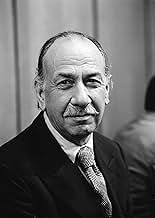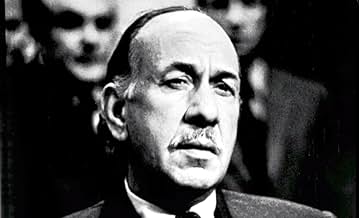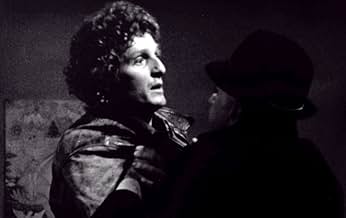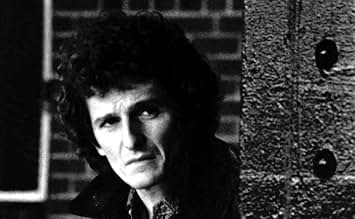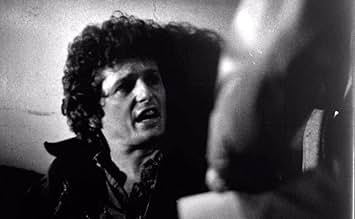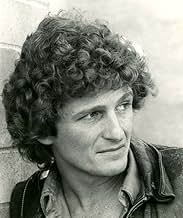NOTE IMDb
7,7/10
740
MA NOTE
Ajouter une intrigue dans votre langueA homicide detective begins to suspect that the black teenager accused of murdering two white girls is being framed by his fellow detectives.A homicide detective begins to suspect that the black teenager accused of murdering two white girls is being framed by his fellow detectives.A homicide detective begins to suspect that the black teenager accused of murdering two white girls is being framed by his fellow detectives.
- Réalisation
- Scénario
- Casting principal
- Récompensé par 2 Primetime Emmys
- 3 victoires et 4 nominations au total
José Ferrer
- Jake Weinhaus
- (as Jose Ferrer)
Avis à la une
If this had been released theatrically, it could have been a candidate for some Oscars, and likely on most "10 best" film lists for 1973. Probably can be easily said that it's at least one of the 10 best TV films ever made, and ranks right up there with DUEL. It's Telly Savales' best performance, and that means he's superb. It's the role he was meant to play and no wonder it became the popular KOJAK television series. I saw this when first broadcast in 1973, and found it completely absorbing, at a time when I was more interested in action and horror stuff, like most kids, and when I could barely sit still for anything dramatic, but Savales held my attention, and the storyline never sagged. Everything in the film is top-notch, and a later second viewing years afterward only confirmed this. You won't be disappointed!
Effectively the pilot for the long running TV detective series 'Kojak", this TV movie is actually far more than that, being a dramatisation (with names changed) of an important case in American legal history, in establishing the rights of a defendant to have their legal rights read to them before answering questions relating to the offence.
Not that it helped the young unemployed black victim here, subject to a monstrous miscarriage of justice which sees him charged with three murders and an attempted rape he patently didn't do, who ended up serving time despite the efforts of in particular Kojak (a composite of the actual officers who bravely stood up for the accused) and an experienced defence attorney played by Jose Ferrer after the original court appointee (played by Robert Walden, later Joe Rossi in "Lou Grant") palpably fails him.
The direction eschews showiness and documents with fly-on-the-wall realism, the seamy methods of a so-called respected police force to pin a crime on the first donkey who comes along.
Fans of the TV series will be surprised to see none of the excellent supporting cast which made the show such a success in the 70's, like Dan Frazer and Kevin Dobson, although Telly's brother George, later the hang-dog Stavros gets a bit part as a newspaper reporter. Kojak himself isn't the finished article either as we see him act in ways he never would later on, such as violently losing his temper with a suspect, getting up close and personal with a past lover and even just working as a lone wolf much of the time. Savalas himself is excellent, already displaying the intensity of his character in his fine Italian clothes, although at this stage in his development catch-phrase and lollipop-less.
I read up on the "Career Girls" murders case which begot this drama and commend the makers for staying true to the story and bringing to light an unacceptable weakness in US justice. The fact that it led to a TV series as good as any to ever come of American television was just a bonus, albeit a very good one.
Not that it helped the young unemployed black victim here, subject to a monstrous miscarriage of justice which sees him charged with three murders and an attempted rape he patently didn't do, who ended up serving time despite the efforts of in particular Kojak (a composite of the actual officers who bravely stood up for the accused) and an experienced defence attorney played by Jose Ferrer after the original court appointee (played by Robert Walden, later Joe Rossi in "Lou Grant") palpably fails him.
The direction eschews showiness and documents with fly-on-the-wall realism, the seamy methods of a so-called respected police force to pin a crime on the first donkey who comes along.
Fans of the TV series will be surprised to see none of the excellent supporting cast which made the show such a success in the 70's, like Dan Frazer and Kevin Dobson, although Telly's brother George, later the hang-dog Stavros gets a bit part as a newspaper reporter. Kojak himself isn't the finished article either as we see him act in ways he never would later on, such as violently losing his temper with a suspect, getting up close and personal with a past lover and even just working as a lone wolf much of the time. Savalas himself is excellent, already displaying the intensity of his character in his fine Italian clothes, although at this stage in his development catch-phrase and lollipop-less.
I read up on the "Career Girls" murders case which begot this drama and commend the makers for staying true to the story and bringing to light an unacceptable weakness in US justice. The fact that it led to a TV series as good as any to ever come of American television was just a bonus, albeit a very good one.
"The Marcus-Nelson Murders" is a made for TV movie set in the summer of 1963 that turned out to be the pilot for "Kojak". It's based on a real case, 'The Career Girl Murders' of Emily Hoffert and Janice Wylie, though names and a few other details have been changed. The film details the investigation as well as the misconduct by the New York Police Department, as the accused was denied his rights to an attorney and was forced into confessing for a crime he did not commit. This is a fact, as the real killer was eventually caught and later confessed to the crime...though the falsely accused man was also sent to prison for several years! The injustice of the case helped lead to the landmark Miranda Decision in 1966.
The story begins with two young women being attacked and viciously murdered by a psycho with a knife. One was also raped.
You never see who he is and the film shows the case from the standpoint of the police department...as well as from the investigator, Lieutenant Kojack (the name was changed to 'Kojak' for the TV series). Over time, he starts to wonder if the confession was infact coerced and if the young man is being victimized. Naturally, the Department is not thrilled with Kojack's actions and they just want him to just drop his inquiry...especially the prosecutor.
If you are expecting something like "Kojak", you'll probably be disappointed. Aside from Telly Savalas and a brief scene where George Savalas plays a reporter, the cast is entirely different from the TV show. This isn't good nor bad...it's just different. And, it's generally a very good film. My only quibble is a very small one...everything looks like 1973 instead of 1963...such as clothing and hairstyles.
By the way, this film came out the same year as "Serpico"...a true film about corruption within the New York Police Department.
The story begins with two young women being attacked and viciously murdered by a psycho with a knife. One was also raped.
You never see who he is and the film shows the case from the standpoint of the police department...as well as from the investigator, Lieutenant Kojack (the name was changed to 'Kojak' for the TV series). Over time, he starts to wonder if the confession was infact coerced and if the young man is being victimized. Naturally, the Department is not thrilled with Kojack's actions and they just want him to just drop his inquiry...especially the prosecutor.
If you are expecting something like "Kojak", you'll probably be disappointed. Aside from Telly Savalas and a brief scene where George Savalas plays a reporter, the cast is entirely different from the TV show. This isn't good nor bad...it's just different. And, it's generally a very good film. My only quibble is a very small one...everything looks like 1973 instead of 1963...such as clothing and hairstyles.
By the way, this film came out the same year as "Serpico"...a true film about corruption within the New York Police Department.
I came across this movie whilst channel surfing and boy was I pleasantly surprised. I was expecting an episode of the TV series but instead got a gritty 70'd classic. This a low down story of Police and the systems corruption which is still relevant today. Telly Savalas is superb as Kojack the only decent cop in New York who is prepared to see the set up that is taking place. A slow reveal with excellent supporting cast makes this a recommendation for everyone. This is truly an undiscovered gem that if it was a cinema movie would still be lauded today. This is a movie that really needs wider exposure. Now how to I go about getting the to show it at the BFI?
I agree with the other comment on this-I feel this is an excellent film and, when i voted for this film I noticed that many of the high votes were by people roughly the same age as me (18) who, like me, probably don't remember when this was originally shown- I feel this speaks volumes about how relevant and engaging this film remains after all these years... and don't get me wrong - I have hardly ever seen Kojak but this film as it stands on its own makes sense and is very good. I wont spoil the film but I'll just say that I also like how the film doesn't really have a definite answer and leaves the viewer to agree or disagree with the ending. I'd recommend buying this if you can as It's a good price these days but still a great film.
Le saviez-vous
- AnecdotesThe film is based on an actual case known as the "Career Girl" murders that happened on 28 August 1963. It was the date on which Martin Luther King delivered his "I Have A Dream" speech, as mentioned in the film.
- GaffesWhen Lt. Theo Kojack drives to Lewis Humes's party, a camera shot inside his Ford Torino shows the car has a plastic, sport side-view mirror on the driver's door. When he arrives and parks to proceed to the party, the Torino now has a metal, square, chrome, side-view mirror on the driver's door.
- Citations
Jake Weinhaus: That's a nice woman, Saul. She managed to say goodbye even though I told her I couldn't save her son.
- ConnexionsFeatured in The 25th Annual Primetime Emmy Awards (1973)
Meilleurs choix
Connectez-vous pour évaluer et suivre la liste de favoris afin de recevoir des recommandations personnalisées
Détails
- Date de sortie
- Pays d’origine
- Langue
- Aussi connu sous le nom de
- Der Mordfall Marcus-Nelson
- Lieux de tournage
- St Johns Pl and East New York Avenue, Brooklyn, Ville de New York, New York, États-Unis(Patrolman Stabile first finds Lewis Humes - north corner - then phones from police callbox - east corner of East New York Avenue and Strauss St.)
- Sociétés de production
- Voir plus de crédits d'entreprise sur IMDbPro
- Durée
- 2h 5min(125 min)
- Mixage
- Rapport de forme
- 1.33 : 1
Contribuer à cette page
Suggérer une modification ou ajouter du contenu manquant

